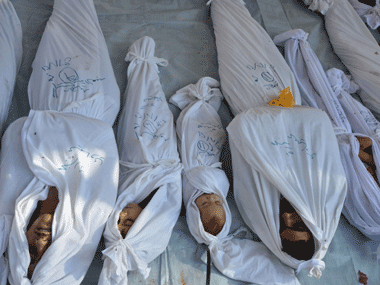Beirut: One year after the deadly chemical attack on rebel-held areas outside Damascus, the victims and their families have yet to see those behind the mass killings held responsible, a human rights group said Thursday. In the early hours of August 21, 2013, rockets carrying the nerve agent sarin slammed into the rebel-held suburbs of the Syrian capital of eastern Ghouta and Moadamiyeh. Hundreds were killed in what amounted to the UN chief called the “worst use of weapons of mass destruction in the 21st century.” The Syrian opposition and its allies, including the United States, accused Damascus of carrying out the attack. President Bashar Assad’s government denied responsibility, and blamed the rebels. [caption id=“attachment_1585925” align=“alignleft” width=“380”]  File photo of scores who died in after Sarin gas was used in Syria. Reuters image[/caption] UN inspectors conducted a swift investigation that determined rockets loaded with sarin had been fired from an area where the Syrian military has bases. But the UN probe’s limited mandate did not authorize the experts to identify who was responsible for the attack. The Obama administration, meanwhile, threatened to carry out punitive airstrikes against the Syrian government, triggering a flurry of diplomacy that eventually resulted in Assad accepting a US-Russia brokered deal to relinquish his chemical arsenal. Over the past 11 months, a joint mission by the UN and the Organization for the Prohibition of Chemical Weapons has overseen the removal of all of Syria’s declared chemical stockpile from the country and transported abroad for destruction. More than 80 percent of those materials have been neutralized so far, according to the OPCW. Nadim Houry, deputy Middle East and North Africa director at the New York-based Human Rights Watch, welcomed the removal of Syria’s chemical arsenal, but said its destruction “will do nothing for the hundreds of victims who died a year ago and the relatives who survive them.” “Closure of the chemical weapons issue in Syria will be possible only when those who ordered and executed the Ghouta attacks have been held to account and are behind bars,” Houry said in a statement Thursday. AP
Syria’s opposition and its allies, including the United States, accused Damascus of carrying out thechemical weapons attack. President Bashar Assad’s government denied responsibility, and blamed the rebels.
Advertisement
End of Article
Written by FP Archives
see more


)

)
)
)
)
)
)
)
)



